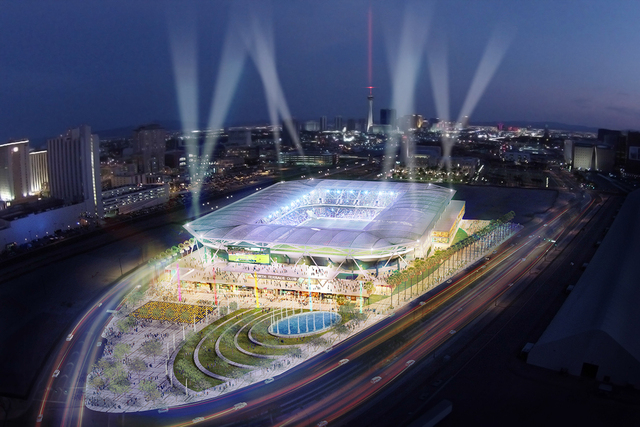Failed soccer stadium project cost Vegas $3.1 million

The city of Las Vegas spent $3.1 million on a failed soccer stadium project in Symphony Park, according to a staff report presented to City Council members Wednesday.
A staff report states that most of that money was paid to the project’s would-be developers at Baltimore-based Cordish Companies, which made $2.5 million for failing to build on the 13-acre downtown stadium parcel.
Much of the rest went to a throng of public relations and economic development consultants that helped orchestrate a weekslong PR blitz aimed at selling the soccer venue to the public.
City leaders last month took a pass on a long-sought deal to build the project, a decision that came after weeks of political and legal wrangling that prompted Major League Soccer to pull Las Vegas out of the running to land the league’s 24th expansion franchise.
Only a relatively meager $299,000 went toward city staffing and planning costs on the abandoned project, according to the report compiled by City Manager Betsy Fretwell.
An additional $180,000 paid for a consultants’ study of a tourism improvement district approved Monday by the Nevada Commission on Tourism. The newly approved district will allow Las Vegas to siphon off future sales tax revenue from a Symphony Park-adjacent outlet mall in order to pay for a $25 million parking garage once meant to support the city’s now defunct stadium.
Wednesday’s stadium spending report, which was requested by Mayor Pro Tem and mayoral candidate Stavros Anthony in February, goes on to highlight some $11,000 in City Council travel expenses associated with the failed push to land a Major League Soccer expansion franchise, including council members Steve Ross and Ricki Barlow’s tickets to an MLS game in Portland, as well as Mayor Carolyn Goodman’s flight to lobby MLS executives in New York.
It also includes some $3 million the city made selling its old City Hall to online shoe retailer Zappos, which now occupies the building that city leaders had once hoped to raze for a downtown soccer venue.
Anthony, one of three council members who signed onto a lawsuit aimed at blocking the city’s use of $56 million in public funds to pay for a revised stadium blueprint in Symphony Park, offered a laundry list of what he sees as other, better uses for the millions of dollars used to research the stadium project.
The Ward 4 councilman has asked the city to tie up room tax revenues once destined for the project, which he fears might not be dead, just hibernating.
“I had no idea (the spending total) would be that high,” he said Tuesday. “I’d have to pencil it out, but I know that ($3.1 million) would pay first-year salary for around 30 police officers.
“How many fire rescues could have been paid for? How many sidewalks could have been fixed? How many parks could have been maintained?”
Anthony said he thought consultants were “the only ones who won” as a consequence of city spending on the matter.
That remark sparked an extended back-and-forth between Anthony and Goodman, who he is challenging in this spring’s elections. She accused him of campaigning on City Council time before getting in a little politicking of her own on the role of public-private partnerships in downtown’s ongoing redevelopment.
Councilman Barlow, who is also up for re-election, invited anyone who doesn’t believe in revitalizing downtown to “leave the dais.”
Fellow stadium supporter Bob Coffin suggested that without public-private partnerships such as the ones envisioned in the stadium deal, downtown Las Vegas would be “Detroit, a blight on the landscape.”
Coffin made a records request of his own in February.
Fretwell’s report on that request — which sought tallies of city spending on every publicly subsidized project dating back to 1986 — found the city poured more than $417 million into 86 downtown redevelopment projects over the past three decades.
The city netted around $2.5 billion in total investment in the downtown redevelopment area over the same time period.
Coffin said those figures, which do not include the stadium project, vindicate the city’s financial commitment to downtown redevelopment efforts.
Downtown might not have landed a soccer stadium, he said, but that doesn’t mean the city shouldn’t have tried.
“There has never been a (redevelopment agency) failure that I know of,” Coffin added. “I wouldn’t call the soccer stadium a failure, because it never got started.
“You never know (a project) is a waste of money until you look at it.”
Contact James DeHaven at jdehaven@reviewjournal.com or 702-477-3839. Find him on Twitter: @JamesDeHaven